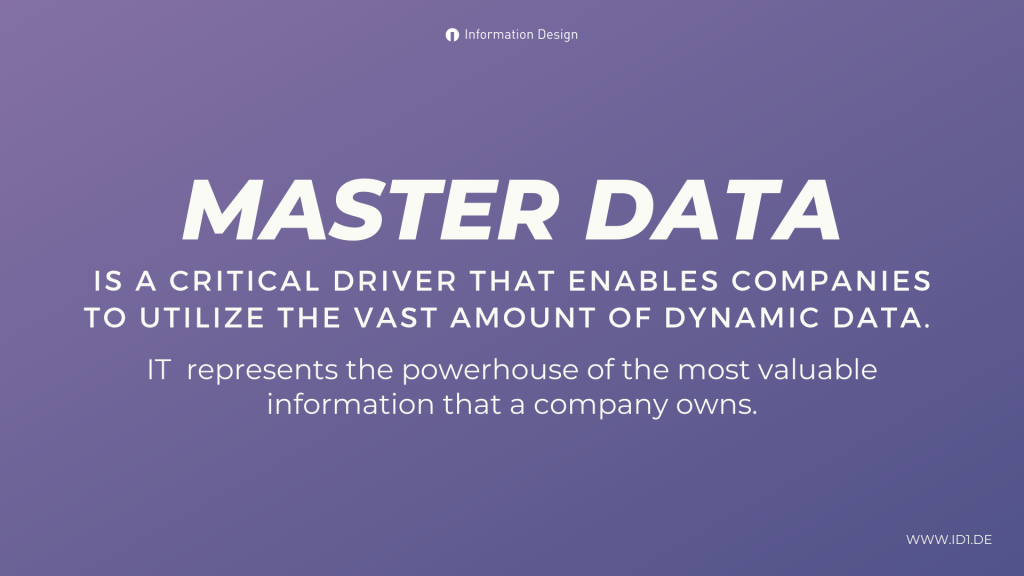However, if you are dealing with that topic, this grey image can be a massive advantage. Because, besides being considered dull, Master Data Management is usually wholly underrated. Moreover, many companies still don’t know the vast potential of Master Data Management. That’s precisely why so many people ask me the question, “Why Master Data Management is important?”
Here’s My Personal View
But let me provide my personal opinion before we dig into the details. My straightforward answer to the question “Why Master Data Management is important?”
I genuinely believe that master data is a critical driver that enables companies to utilize the vast amount of dynamic data. Master data represents the powerhouse of the most valuable information that a company owns. Subsequently, master data helps every department to deliver their job.

Sounds like a steep claim? Continue reading to find out the hard facts of why master data and master data management is so important.
What Is Master Data Management About?
Let’s provide some context first. Master Data Management aims to provide a seamless process of providing master data to all relevant processes along a process chain.
In this context, this discipline mainly serves four core aspects:
- Collecting master data in a central repository
- Providing transparent data maintenance processes
- Provision of master data to systems and stakeholders
- Defining data governance procedures
If you want to know more, follow this link.
Why’s Master Data Management Important — Here Are 7 Reasons
#1 — It Reduces Workload
Without central Master Data Management, every department is responsible for collecting and maintaining master data. Accordingly, the same master data is collected twice and more often. And even worse, the identic master data is maintained by more than one department.
Why’s that? Because a considerable part of a company’s master data isn’t department-specific. On the contrary, it is —quite often— required on a corporate-wide level.
Master Data Management defines a clear governance process. That means every piece of master data is collected only once. Therefore, it reduces the workload in business departments due to the reduced or eliminated effort to maintain master data independently.
#2 — Master Data Management Improves Data Quality
One of the main deficits of unstructured, decentralized data management is quality. Every department is maintaining its truth. And this inevitably leads to problems in terms of reporting or cross-functional processes.
On the contrary, a thorough Master Data Management acts as one single source of truth. A source that provides all relevant master data and directly leads to the benefit of superior data quality. Data quality in this context isn’t only about the correct data but also the most up-to-date.
#3 — Data Compliance & Governance Processes
Having all master data in one central place enables companies to set up dedicated data compliance and governance processes. In addition, state-of-the-art master data systems provide the possibility to define structured data responsibilities.
A structure that answers the question of “Who is allowed to change and maintain master data at certain stages.” Thereby, responsibilities are documented to ensure only the responsible department/person maintains data. Again, this directly leads to improved data quality.

#4 — Reduces time-to-market
When introducing new applications and systems, a central master data system reduces the setup effort massively. Instead of manually setting up master data within the new solution, connecting it to the primary master data system directly provides the required master data.
As a result, the time-to-market for new systems, solutions, or functionalities is accelerated instantly and sustainably. An important reason that is often underrated yet so important!
#5 — Improved Business Processes Efficiency
Master data management represents the perfect single source of truth to support business processes. Since many master data systems offer easy-to-use (mobile) applications, employees can access the latest and high-quality master data whenever needed to support their operations. Accordingly, employees quickly access a vast knowledge base. Ultimately, that helps to drive process efficiency.



#6 — Improves Decision Making
Master data management offers the possibility to provide a holistic, comprehensive, and complete view of a company’s master data across the organization. As a result, company-wide decision processes rely on the identical and latest set of master data. Subsequently, it helps executives, senior management, and other employees make informed and fact-based decisions.
This is an essential aspect you have to understand. When it comes to decision-making, dynamic data is most often in the spotlight. However, as mentioned in my initial statement, master data is the powerhouse that drives your dynamic data.
#7 — Master Data Management Eliminates Manual Processes
At many companies, maintaining master data still reflect a highly manual task. Moreover, Excel spreadsheets are a prominent tool when it comes to master data maintenance.
Why is this a benefit? First of all, manual processes are always a source of failures and a driver of inefficiency. Secondly, although Excel sheets are easy-to-use, they show massive disadvantages when exchanging data with other systems.
A centralized and system-based Master Data Management eliminates both of the issues. There’s no longer a need for creating and maintaining personal Excel files. On the contrary, data governance processes should even restrict that approach. On top of that, a master data system —usually— offers a broad range of integration possibilities.
What Do You Think?
What are the reasons you consider important? And what’s your view on that topic in general? I would be happy to receive your feedback and thoughts. Just hit me up on Twitter or get in touch on LinkedIn.





